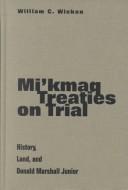| Listing 1 - 3 of 3 |
Sort by
|

ISBN: 1442670215 9781442670211 080200718X 9780802007186 0802076653 9780802076656 Year: 2001 Publisher: Toronto University of Toronto Press
Abstract | Keywords | Export | Availability | Bookmark
 Loading...
Loading...Choose an application
- Reference Manager
- EndNote
- RefWorks (Direct export to RefWorks)
In 1725-6 the British colonial government of Nova Scotia signed a treaty of friendship and peace with the local Mi'kmaq people. This treaty explicitly acknowledged the co-existence of Mi'kmaq and British law - but much of its meaning stemmed from its complex negotiation, which was influenced by the history of aboriginal-European relations in Acadia prior to 1726. William Wicken argues that after 1749 a more forceful British military presence led officials to re-interpret the treaty in the light of its own interests.From 1994 to 1996, the author was an expert witness for the defence at the Marshall trial, during which the Supreme Court of Canada integrated aboriginal perspectives on treaty-making into current interpretations. Dr Wicken was one of the historians who gathered and presented the historical evidence to the court. This timely and original work intersperses close analysis of the 1726 treaty with discussions of the Marshall case, and shows how the inter-cultural relationships and power dynamics of the past, have shaped both the law and the social climate of the present. The author argues that the treaties must be viewed in their historical context, and that of the oral tradition of Mi'kmaq people, to be properly understood.Current high-profile legal cases involving aboriginal rights lend this work a special significance among the legal and academic communities, where it is destined to spark debate. It is of particular relevance to history and native studies students.
Micmac Indians --- Indians of North America --- Mickmak Indians --- Migmac Indians --- Mi'kmaq Indians --- Mi'kmaw Indians --- Algonquian Indians --- Mi'kmaq peoples --- Marshall, Donald, --- Trials, litigation, etc. --- Marshall, Donald
Book
ISBN: 0773581189 1282867113 9786612867118 0773576673 Year: 2009 Publisher: Montreal ; Ithaca [N.Y.] : ©2009 McGill-Queen's University Press,
Abstract | Keywords | Export | Availability | Bookmark
 Loading...
Loading...Choose an application
- Reference Manager
- EndNote
- RefWorks (Direct export to RefWorks)
The Supreme Court of Canada decision in the Marshall case asserted sweeping Native treaty rights and generated intense controversy. In Power without Law Alex Cameron enlivens the debate over judicial activism with an unprecedented examination of the details of the Marshall case, analyzing the evidence and procedure in the trial court and tracing the legal arguments through the Court of Appeal to the Supreme Court of Canada. He argues that there were critical defects in the process - the successful argument at the Supreme Court of Canada was never tested in the lower courts, the Crown's expert was precluded from testifying about a vital document, the Court's analysis does not accord with the historical evidence, and the treaty rights are inconsistent with the colonial law of Nova Scotia. Concluding that the Marshall decision was the result of incautious judicial activism, Power without Law challenges us to reconsider the role of our courts in the Charter era.
Malecite Indians --- Political questions and judicial power --- Legal status, laws, etc. --- Marshall, Donald --- Canada.

ISBN: 1282858947 9786612858949 0773568778 9780773568778 0773521089 9780773521087 0773521046 9780773521049 Year: 2000 Publisher: Montréal [Que.] : McGill-Queen's University Press,
Abstract | Keywords | Export | Availability | Bookmark
 Loading...
Loading...Choose an application
- Reference Manager
- EndNote
- RefWorks (Direct export to RefWorks)
In The Marshall Decision and Native Rights Ken Coates explains the cross-cultural, legal, and political implications of the recent Supreme Court decision on the Donald Marshall case. He describes the events, personalities, and conflicts that brought the Maritimes to the brink of a major confrontation between Mi'kmaq and the non-Mi'kmaq fishers in the fall of 1999, detailing the bungling by federal departments and the lack of police preparedness. He shows how political, business, and Mi'kmaq leaders in the Maritimes handled the volatile situation, urging non-violence and speaking out against racism, in contrast to the way federal and regional leaders have responded in other parts of the country. Legal victories such as Marshall, argues Coates, are a double-edged sword that provide greater legal clarity but expand the gap between indigenous and non-indigenous peoples in Canada. Coates recounts the history of Mi'kmaq-white contact in the region and considers the impact of native rights on natural resources, showing that the costs will be borne mainly by rural Canadians. By placing the local and regional reaction to the Marshall decision in the broader historical, national, and international context of indigenous political and legal rights The Marshall Decision and Native Rights shows how little Canada has learned from three decades of First Nations legal conflicts and how far the country is from meaningful reconciliation.
Malecite Indians --- Micmac Indians --- Natural resources --- Mickmak Indians --- Migmac Indians --- Mi'kmaq Indians --- Mi'kmaw Indians --- Algonquian Indians --- Indians of North America --- Etchemin Indians --- Mahnesheets Indians --- Maliseet Indians --- Malisit Indians --- Marashite Indians --- Marechite Indians --- Maricheet Indians --- Mayisit Indians --- Melicete Indians --- Milicete Indians --- Tobic Indians --- Tobique Indians --- Abenaki Indians --- National resources --- Resources, Natural --- Resource-based communities --- Resource curse --- Government relations. --- Government policy --- Legal status, laws, etc. --- Economic aspects --- Marshall, Donald --- Marshall, Donald, --- Trials, litigation, etc. --- Mi'kmaq peoples
| Listing 1 - 3 of 3 |
Sort by
|

 Search
Search Feedback
Feedback About
About Help
Help News
News